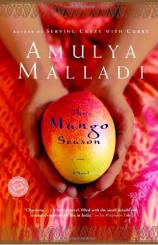Reading Group Guide
Discussion Questions
The Mango Season

1. What is the significance of the title The Mango Season? How about the title of the prologue, "Happiness Is a Mango"? Why does Amulya Malladi constantly refer to mangoes, and how does this symbol resonate within the novel as a whole?
2. How is the constant reference to food significant to the unfolding of the story? What does the inclusion of recipes add to the "flavor" of the book?
3. In which ways does Priya embrace America upon her arrival there? Which cultural traditions does she eschew?
4. Contrast Priya's relationship to her mother with those she has with her father and brother.Why do you think she finds it easier to relate to the males in her family? What sets Priya and her mother at odds?
5. Do you think that Priya should have told her family about her engagement right away, perhaps even before her arrival in India? Why doesn't she? What larger problems does her reluctance to discuss her romance indicate about Priya's relationship with her family?
6. What is your impression of Nick through Priya's rendering of him via her memories and their e-mail correspondence? What characteristics are appealing about him?
7. What are Nick's fears about Priya returning to India? Why does he want to go with her? How are his worries borne out?
8. Why does Malladi disclose Nick's race only at the end of The Mango Season? What hints does she sprinkle throughout the book that he is black? Does this disclosure make a difference in your understanding and perception of the novel?
9. How are Priya's female relatives constrained by their places in society? How do they chafe under these restrictions? Do any rebel, and if so, how? What effect does Priya have on them, and in turn, how do they influence her?
10. What spurs Sowmya to exact promises from her future husband before she's married? Does this surprise you, based on Sowmya's characterization at the beginning of the book?
11. "What can we do when someone takes your trust and throws it away?" asks Priya's mother (p. 39). How does this theme of establishing --- and losing --- trust thread through the book? How do Priya's relatives trust and distrust her? In which ways has their attitude infantilized her, and how has it made her stronger and more independent?
12. "Happiness is such a relative term that it sometimes loses definition," Malladi writes (p. 56). How does Priya's definition of happiness evolve as the book unfolds? How would her parents define happiness differently from her?
13. Priya refers to the "two people inside me" (p. 69). How does Priya seek to reconcile the two halves of her personality? Which aspects of her character derive from her Indian upbringing? Which from her choice to embrace America?
14. Is Nate indulged more than Priya by their parents? How does he adapt to the strictures of Indian society, and within the family structure in particular? How is he a modern figure, and how does he feel a link to the past?
15. "Behind the façade . . . we were strangers to each other," Priya says of her family (p. 98). Is this statement an accurate representation of her familial relationships? With whom in the family is Priya most herself?
16. Why does Priya go through with the bride-seeing ceremony? What about her might be attractive to Adarsh? What are the benefits and disadvantages to having an arranged marriage?
17. How does Priya envision love and marriage? In which ways is this an "American" view, and how is it influenced by her Indian heritage? How does it contrast with the vision of her family in India?
18. How does Thatha view Priya's refusal to marry a handpicked Indian beau? Do you believe that their relationship will ever recover? Why were they close in the first place, despite their differences?
19. "You cannot make mango pickle with tomatoes," Thatha says to Priya (p. 170). How does this sum up his view of her relationship with Nick? Does it also apply to any other relationships in the book?
20. "I had to start living my own life on my own terms," Priya says (p. 142). Is this goal easier to accomplish when Priya is in the United States? Why? Does being in India stifle her sense of self?
21. How does the theme of sacrifice thread throughout the book? What sacrifices is Priya prepared to make for love? How does her mother hold up her sacrifices to Priya, to force her daughter to accede to her wishes? Ultimately, is this an effective technique?
22. How does racism, both against Indians and within the Indian ulture itself, influence the perceptions that the Indian characters in the novel have of Americans? What else informs their perception of blacks, whites, and "foreigners"? What slights do you think Indians have felt based on the color of their skin?
23. Malladi deliberately leaves the ending of the novel ambiguous. Why? What do you envision occurring once Priya's family receives the photograph of Nick?
The Mango Season
- Publication Date: October 26, 2004
- Genres: Fiction
- Paperback: 272 pages
- Publisher: Ballantine Books
- ISBN-10: 0345450310
- ISBN-13: 9780345450319







